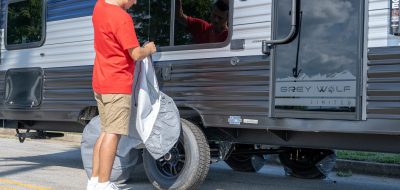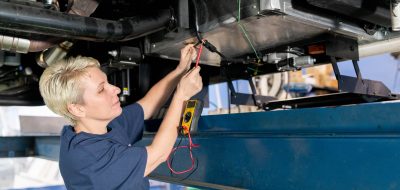By Ken Freund
After a long winter, the elements can be really tough on trailers, campers, tow vehicles, and motorhomes, especially if they’re left exposed outdoors. Now’s the time to get a jump on summer by preparing your RV for the road. Don’t wait until the day before, as there won’t be time to solve any significant problems that may be discovered.
Recently, we provided some items to check in Preparing for Spring Travel: De-winterizing Your Rig. However, before setting out for an extended trip, there are some more things that should be done at least once a year, preferably after storage and before summer travel season.
Replace batteries in smoke alarms, LP-gas and carbon-monoxide detectors (if they are not hard wired) and test them to confirm they are in working order. Check the pressure gauges on fire extinguishers and look for expiration dates on tags.
Verify that all appliances, including TVs, microwave and regular ovens, refrigerators, air conditioners, and heaters are functioning properly. Pressure test the freshwater system and ensure the hot-water heater works properly. Add chemicals to the blackwater holding tank through the toilet. Check that the freshwater hose and dump hose are in good condition, and organize the storage compartments.
Prepare an emergency kit, which should include a powerful flashlight, engine oil, automatic transmission fluid (if so equipped), brake fluid, power-steering fluid, a clean, empty gas can, road flares, three reflective safety triangles, duct tape, jumper cables, wheel chocks, plus basic tools. Check your spare tire(s) for condition and pressure and make sure you have a jack and lug wrench.
Chassis
Pre-travel preparations should include a thorough chassis inspection and service. Be sure to refer to the owner’s manual and maintenance guide and follow this advice to maintain your warranty, if it is still in effect. Change the engine oil and filter on your electric generator, tow vehicle or motorhome. Now’s also a good time to replace the air and fuel filters, spark plugs, PCV valve, oxygen sensor(s), diesel exhaust fluid (DEF), etc. Refer to the maintenance schedule for other items, such as belt, wire and hose inspections, wheel alignment check, etc. Wheel bearings and brakes on trailers should be inspected and repacked annually.
Look underneath for telltale signs of leaks from fuel, coolant, or lubricants. If any are found, note the location and type of fluid. Many times, rodents will chew on hoses, wires, insulation, etc., and make nests on manifolds, in air cleaners, and other vital components. This can lead to breakdowns and even fires, so look carefully for damage.
Inspect the chassis for loose, leaking, or broken shock absorbers, springs, etc., and (especially on trailers) worn shackles or spring equalizers. Where possible, grease the chassis. Brakes should be inspected and checked for operation. Brake fluid should be changed about every two years and air brake tanks should be drained of moisture. Coolant should be flushed and replaced about every three to five years, depending on whether it is a regular or long-life formula. It’s also a good idea to change transmission fluid, power steering fluid, and differential lubricant every few years when towing.
Test all interior and exterior lights and repair as necessary. Besides bulbs burning out, often the problem is corroded terminals or ground connections
In addition to setting tire pressures, tires are subject to aging, so check for sidewall cracks and other damage. Tires have a date code on the sidewall following the marking “DOT;” the last four numbers indicate the week and year of manufacture. For example, 1210 indicates the 12th week of 2010. Have a professional tire technician inspect older tires to determine if they require replacement. Tires older than six years are considered prime for “re-tirement.”
Before taking your RV on a trip, drive it on a local “shakedown” run first.
Read more Tech Tips




